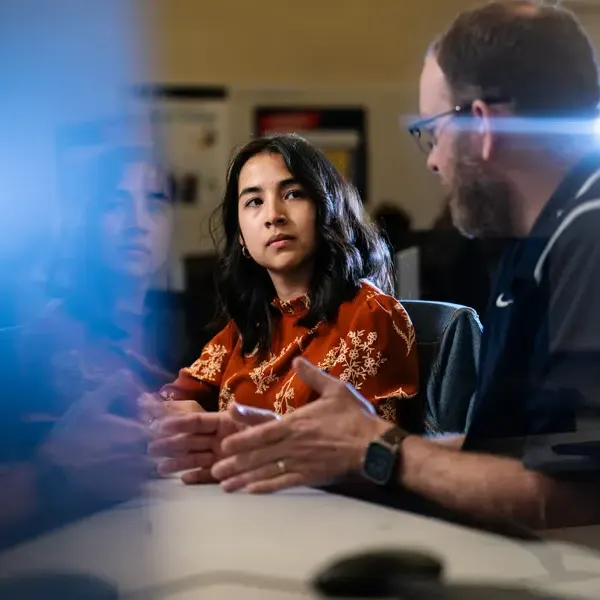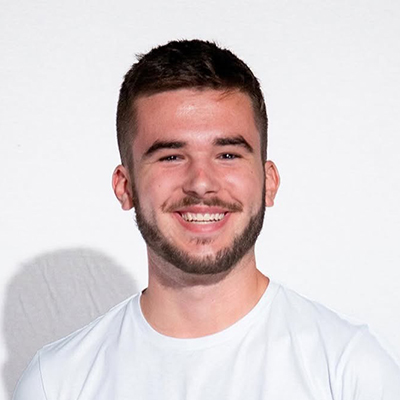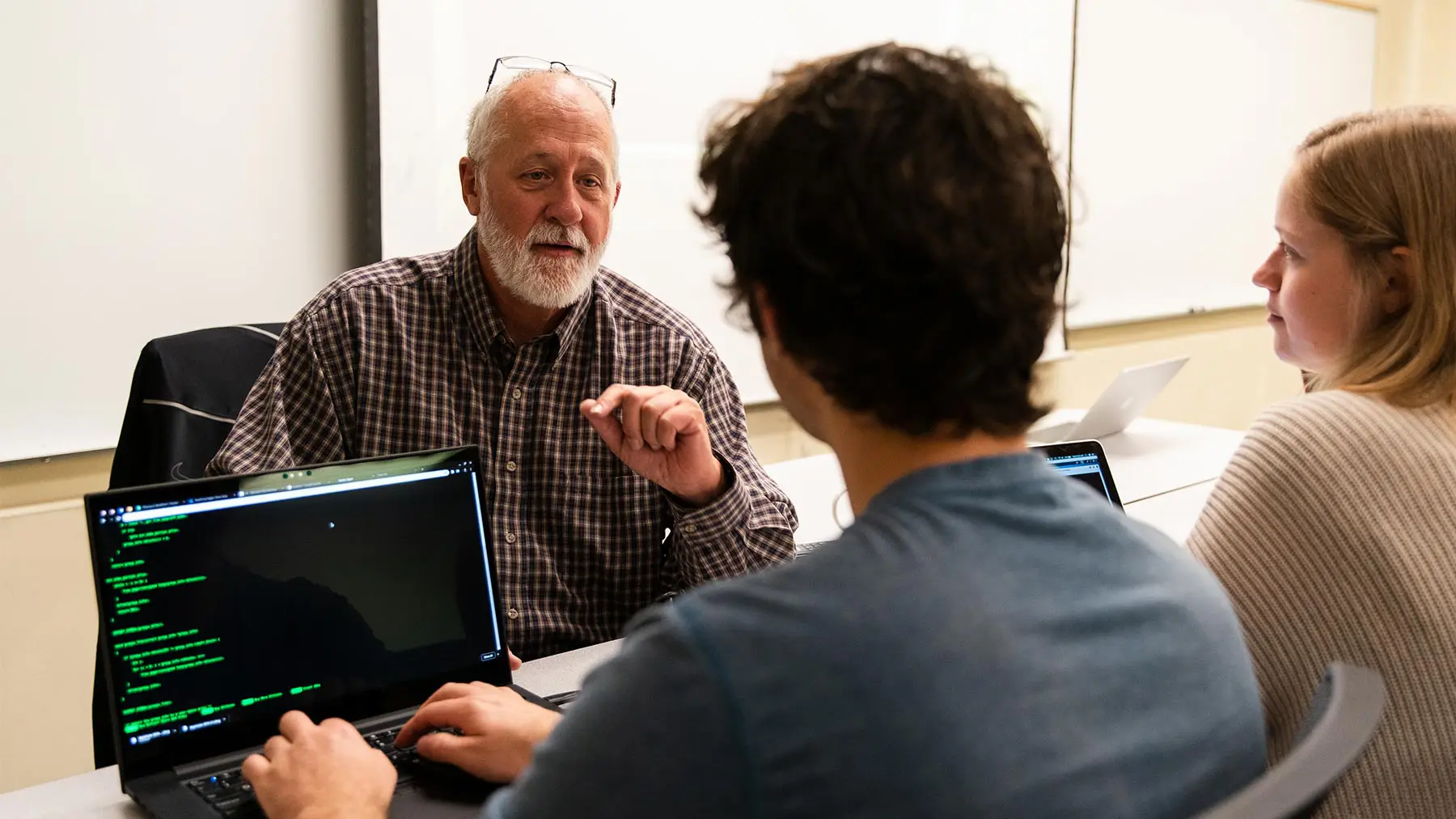At A Glance
Program Type
Concentration of the computer science major (BS)
Accreditation
Northwest Commission on Colleges and Universities (NWCCU)
Program
Collaboration with the School of Engineering
Facilities
Access to our 16,000-square-foot Maker Hub

You’ve read the headlines about online hackers. Now that devices outnumber people globally, it’s increasingly challenging to keep personal and business data safe. But you can be part of the solution!
As a student in our cybersecurity concentration, an area of study within our computer science major, you’ll learn how to protect computer and data systems from these malicious attacks.
In an age with increasing dependence on the internet for commerce, the world needs individuals with the skills to combat hackers. Millions of messages, data files and transactions flow through business networks and across the internet each day, collectively driving the U.S. economy.
Our nation’s dependence on this vast electronic infrastructure is unquestioned, and few businesses can survive without safe networks and reliable internet access. Every company is increasingly at risk from cyber attacks.
Alignment with National Requirements
George Fox is one of only a handful of private schools in Oregon that offer a cybersecurity course of study. The goal of the program is to align with requirements for designation as a Center for Academic Excellence in Cyber Operations – a certification of the National Security Agency and Central Security Service.
Competitions
Are you competitive? If so, you’ll love “suiting up” for competitions that include the International Collegiate Programming Contest, the National Collegiate Cyber Defense Competition, the Department of Energy CyberForce Competition, and the National Cyber League. We consistently place high and often defeat teams from much larger institutions.
In March 2025, a group of George Fox cybersecurity majors, coached by Brent Wilson, placed second at the three-day Pacific Rim Regional of the Collegiate Cyber Defense Competition in Olympia, Washington. In 2024, George Fox finished in the top 20 nationally and in the top five in the western states in a National Cyber League cybersecurity skills competition that included more than 8,500 students from 510 colleges and universities.
Mentorship Opportunities
Students in the engineering program have the opportunity to engage in industry mentorship through the Ignite program. As an Ignite member, you are matched with Christians in the industry. You’ll meet monthly to discover opportunities, develop connections, address career gaps, and ask questions.
Program Distinctives Why Study Cybersecurity at George Fox?
-
There are two schools of thought in cybersecurity:
- Only teach defense; don’t teach students anything that could be misused.
- Teach both offense and defense; the student must understand the threat environment in order to defend against it.
We are a “type two” school and proud of it! You will get “ethical hacking” experience – the “lawful” cracking of computer systems and networks. To that end, you’ll learn the tools and techniques of hackers so that they can be used for good and noble causes.
-
You will learn a variety of cybersecurity techniques including open source intelligence, cryptography, password cracking, digital forensics, log analysis, network traffic analysis, network and system scanning, wireless access exploitation and defense, web application and defense.
-
Our cybersecurity program is layered on top of the computer science major and housed in the College of Engineering. This means you will get a well-rounded experience, from using low-level hardware to high-level instrumentation.
Courses / Curriculum What Will I Study?

Our spaces/Where Will I Learn?
Maker Space: Where Innovative Ideas Come to Life
The facility includes:
- A 24-station computing lab
- Eight meeting rooms with 48-inch monitors
- A wood shop with a large computer numerical control (CNC) router
- A metal shop with a CNC milling machine
- And so much more
These spaces surround an open configurable collaboration space known as "the Hub," a 6,000-square-foot area used by students representing a wide range of majors. The computer labs have the processors and computer systems needed to accommodate the demands of our major.
Career Outlook What’s After George Fox
Overall employment in computer and information technology occupations is projected to grow much faster than the average for all occupations from 2022 to 2032. About 377,500 openings are projected each year, on average, in these occupations due to employment growth and the need to replace workers who leave the occupations permanently.
The demand for these occupations is due, in part, to a greater emphasis on cloud computing, the collection and storage of big data, more everyday items becoming connected to the internet in what is commonly referred to as the “internet of things,” and the continued demand for mobile computing.
- Senior Software Engineer, Intel
- Security Analyst, Nike
- Senior Program Manager, Microsoft
- Software Engineer, Oracle
- Senior Software Engineer, GE
- Analyst for Division of Legislative Finance, State of Alaska
- Senior Support Engineer, Fiserv
- Software Developer, McAfee
- Software Engineering Manager, Mentor Graphics
- Senior Research Scientist, Pacific Northwest National Laboratory
- Informatics Research Scientist, DOW AgroSciences
- National Aeronautics and Space Administration (NASA)
- Microsoft
- Intel Corporation
- Amazon
- Nike
- Florida Institute of Technology/National Science Foundation
- Circle Media Labs
- Johns Hopkins University
- Northwestern University
- Oregon Health & Science University
- Boston University
- Baylor University
- University of Oregon
- University of Washington
- Oregon State University
- Washington State University
- George Washington University

Lydia Taw's Journey from 'Ground Zero' to Amazon
As a sophomore with no coding experience, Lydia Taw decided to change her major after struggling with a Data Structures course, known by computer science students as the “weed-out class.”
“I got about halfway through that class and I was like, ‘Everybody knows more than I do. I have no coding experience whatsoever. I’m obviously not smart enough to be in this field,’” Taw recalls.
She dropped the class and the major, but her professors wouldn’t have it.
“They encouraged me to look beyond what I thought I was capable of,” she says. “They literally took me from ground zero to Amazon. My professors played a major role in helping me believe in my ability to do this and developing my confidence.

Louis “Toby” Klauder
Class of 2024
Dr. Orr throughout my academic journey was personally and academically engaging. He took the time to truly understand me, and my cohort - and we developed a great relationship over my 3 years at Fox. From artificial intelligence, to popular culture, to Christianity - he was always willing to chat and made learning from him a blast. During my senior year, he helped me to network for a job opportunity that ended up extending me an offer! He truly is a gem within the CS department.
Request Information About Cybersecurity
